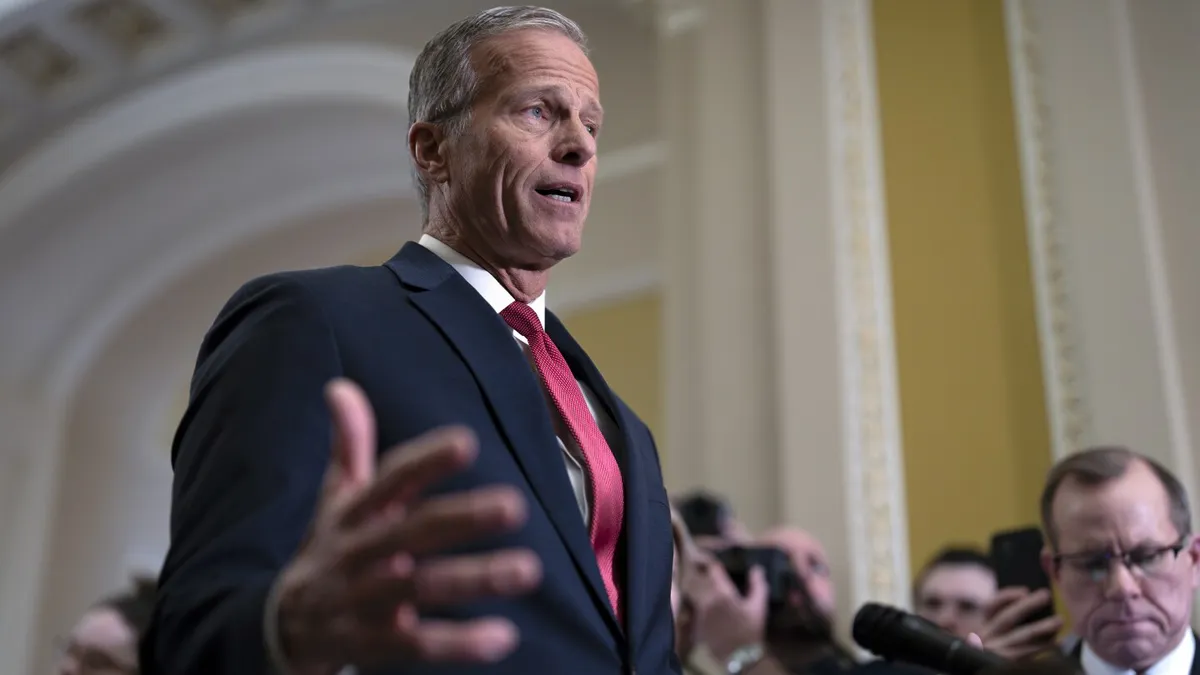
WASHINGTON (AP) — In a decisive move, Senators are prepared to work through the night as they initiate a budget “vote-a-rama” late Thursday. This crucial, albeit challenging, step is essential for advancing a proposed $340 billion package championed by President Donald Trump’s administration. This package aims to fund mass deportations and security measures, which are prioritized on the Republican agenda.
If there was ever a time to witness Congress in action, this might be it. Senators are set to engage in rapid voting for hours, dissecting intricate policy details primarily through amendments proposed by Democrats aiming to halt the package. The final push by Republicans is expected to materialize in the early morning hours, leveraging their majority power for a party-line vote.
“What we’re doing today is jumpstarting a process that will allow the Republican Party to meet President Trump’s immigration agenda,” stated Senate Budget Committee Chair Lindsey Graham, R-S.C., while initiating the debate.
Graham noted that Trump’s top immigration adviser, Tom Homan, informed senators that the administration’s deportation operations are financially depleted and require additional funding from Congress for immigrant detention and deportation efforts.
With limited power in the minority to halt the proceedings, Democrats plan to utilize the all-night debate to compel GOP senators into potentially embarrassing votes, starting with a motion to block tax breaks for billionaires. This motion was rejected on procedural grounds.
Senate Democratic Leader Chuck Schumer warned, “This is going to be a long, drawn-out fight.” He emphasized, “Days like today, where we vote on amendments late into the night, reveal where each party stands and who each party is fighting for. Democrats are glad to have this debate.”
The Republican Senate package proposes up to $175 billion for border security, including funds for mass deportation operations and constructing the U.S.-Mexico border wall. Additionally, it allocates a $150 billion boost to the Pentagon and around $20 billion for the Coast Guard.
Even if the Senate approves the package during the all-night session, funds will not be immediately available. The budget resolution functions as a framework directing various Senate committees—Homeland Security, Armed Services, Judiciary—to finalize the details. Eventually, everything will be compiled into another package requiring another vote-a-rama.
Sen. John Barrasso, R-Wyo., the No. 2-ranking Senate Republican, stated that GOP lawmakers are acting swiftly to provide the administration with the requested resources to reduce illegal border crossings.
“The budget will allow us to finish the wall. It also takes steps toward increasing border agents,” Barrasso said. “It means more detention beds... It means more deportation flights.”
Republicans assert that the entire package will be financed without increasing debt, exploring options for spending cuts and new revenues. Committees may consider rolling back the Biden administration’s methane emissions fee, approved by Democrats as part of climate change strategies in the Inflation Reduction Act, and seek to generate new revenue from energy leases to enhance domestic energy production.
Democrats plan to initiate a vote to prevent tax breaks for billionaires. They argue that GOP tax cuts approved in 2017 benefited the wealthiest Americans, and extending them, as Trump desires, would perpetuate the giveaway.
Sen. Patty Murray, the top Democrat on the Senate Appropriations Committee, highlighted that the primary driver of national debt since 2001 has been a series of Republican-led tax cuts. She criticized the Republican focus on tax cuts instead of addressing issues like the cost of eggs.
“The budget plan is a roadmap for painful cuts to programs families rely on daily, all to give billionaires more tax cuts,” Murray said.
The budget resolution sets up the reconciliation process, a tool increasingly used to pass significant bills on party-line votes when one party controls the White House and Congress, as Republicans do now.
However, Republicans are divided over the approach. The House believes in a “big, beautiful bill,” aiming for a comprehensive solution. Conversely, the Senate favors a two-bill strategy, prioritizing border security before addressing taxes. Budget rules permit passage by a simple majority vote in the Senate, bypassing the typical 60-vote requirement to overcome a filibuster on significant items.
During Trump's first term, Republicans used the reconciliation process to pass GOP tax cuts in 2017. Similarly, Democrats employed reconciliation during the Biden era for COVID-19 relief and the Inflation Reduction Act.
Trump seems to be fueling the debate, pitting House and Senate Republicans against each other to see who can deliver the fastest results.
Associated Press writers Matt Brown and Darlene Superville contributed to this report.